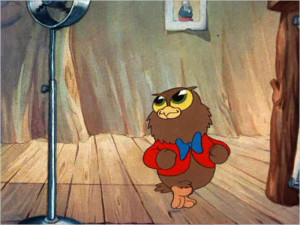 In this iconic cartoon (you can watch the full version below), a young owlet has to choose between following his inner voice and passion for jazz, or pleasing his father by singing what his father believes is best. With Father’s Day in June, it’s important for dads to remember to support their child’s autonomy, allow them to develop into the person they would like to become, and to refrain from exerting too much pressure on conforming to cultural ideals of success or beauty.
In this iconic cartoon (you can watch the full version below), a young owlet has to choose between following his inner voice and passion for jazz, or pleasing his father by singing what his father believes is best. With Father’s Day in June, it’s important for dads to remember to support their child’s autonomy, allow them to develop into the person they would like to become, and to refrain from exerting too much pressure on conforming to cultural ideals of success or beauty.
For those of us who are not fathers, the challenge is to remember that we are the experts of ourselves. Sometimes, in our efforts to please others or comply with societal standards, that is something we may forget. This month’s focus is on re-claiming our role as self-expert. This does NOT mean that you know everything about yourself, or that other people can not offer you insightful or helpful advice, but YOUR voice is not negligable or to be ignored in your growth process.
Owl Jolson Cartoon
Title: Whoooo Knows Best?
Objective:
To explore reasons why we choose to squelch expressing ourselves and what happens when we hold back.
How to:
This month’s proactivity begins with a short visualization. You don’t need to close your eyes if you don’t want to…that would make it difficult to read the instructions! This proactivity is best suited for a role-play or drama therapy scenario but I am also offering directions for using art to process the material generated in the visualization.
Take a moment to sit quietly and think of a time in your life when you were certain that you were right. This can be something about your feelings, your abilities, a piece of trivia, a memory, etc. Now choose one of those events. Did you try to convince others that you were correct? If you spoke up, were you met with resistance or acceptance? Were people validating or invalidating your point of view? Did you choose not to speak up? If so, what kept you from sharing your perspective? How did you feel in that situation? Were you angry, sad, amazed, relieved, empowered, annoyed, defensive, puzzled…?
Now think about how the situation resolved. If you spoke up, were you able or unable to convince them that you were correct? How did the interaction make you feel? Did the experience alter your relationship with the person or people in the moment and or in later interactions? Did this event impact how you assert yourself in situations when you know you are speaking the truth about something? If you didn’t speak up, what feelings and thoughts ran through your mind? Did you ruminate on the situation? Did you find other ways to deal with the unexpressed feelings?
Lastly take a quick inventory and see if you notice any patterns in how you assert your individuality. What situations do you find it more or less difficult to offer your opinion? For example, is it easier to trust that you are correct and speak your mind when you are quoting an article that you read, or talking about sport’s statistics; but more difficult to assert that you feel differently than others about your values, or in a job situation? What is the primary reason you may hold back your opinion?
If this is a drama therapy group, have the group members do role plays of the scenarios that are generated in the visualizations with one of the objectives being to identify the reasons behind not asserting yourself when you are confident that you are correct. Continue the scene to discover what happens when you squelch self-expression? Then re-play the scenes, this time either choosing to navigate around the barriers or finding a different way to manage the unexpressed feelings.
If this is a group that is using art materials, provide paper, pencils, markers, paints, magazines, scissors, glue sticks.
- Choose one scenario from the visualization when you held back expressing yourself and create a visual representation of what barriers “popped up” that kept you from asserting your point of view.
- Now on a second piece of paper, show what you did after the situaion was over. How did you deal with holding back?
Where did those feelings go? - Now take some time and consider whether you could have changed the situation in any way either in regards to speaking out or in how you managed your unexpressed feelings. Try not to be judgemental, you are simply collecting information and learning more about yourself.
This expressive arts directive is from contributing author Dr. Deah Schwartz. Once a month, Dr. Schwartz shares a therapeutic expressive arts therapy activity or idea to facilitate exploration, increased awareness and healing in the areas of body dissatisfaction and eating disorders. Some of these activities may need to be facilitated over more than one session, or modified for different ability levels, size of group, budget and size of work space. These directives may be used in individual or group therapy sessions or as self-help activities. Sometimes the activity itself is nothing new or brilliant but the OBJECTIVE of the directive is unique and specifically tailored to exploring issues related to body image and disordered eating. ENJOY! Fun is the main ingredient! You can learn more about eating disorder therapy here.
Leave a reply